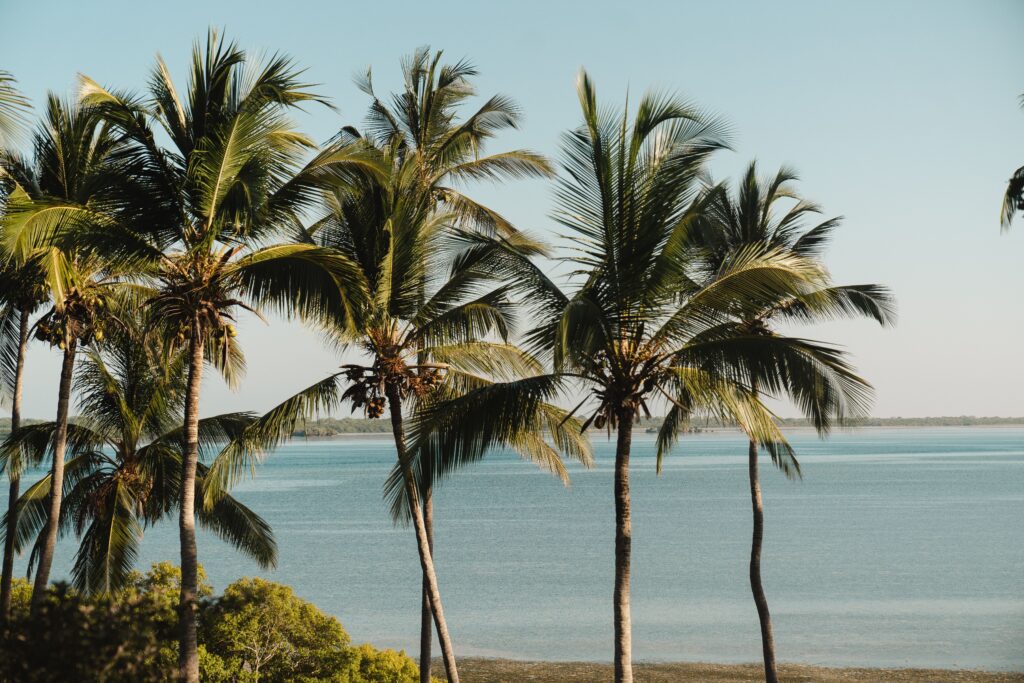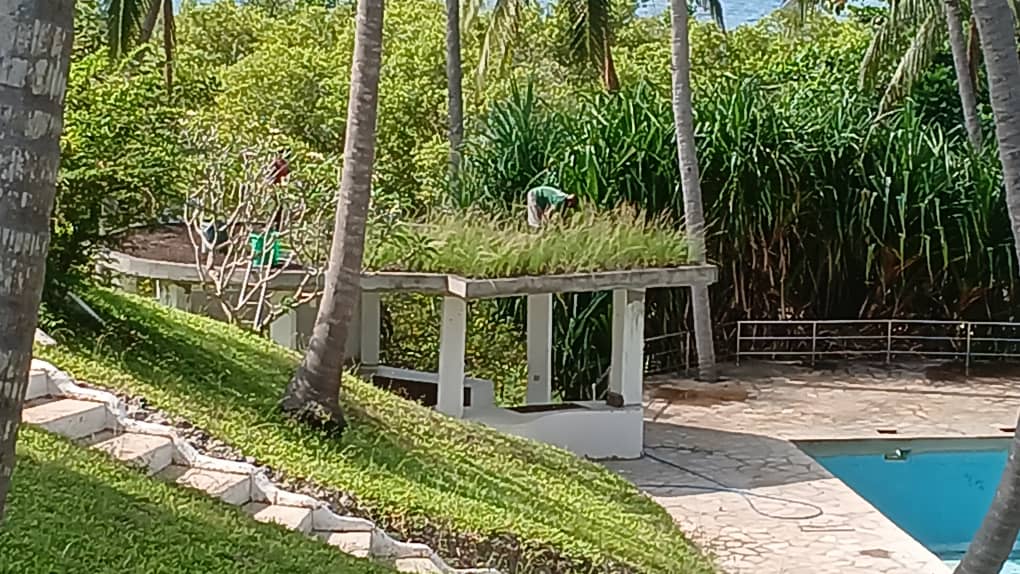Conservation is “Preserving and/or restoring the environment by utilizing natural resources, traditional systems and knowledge sustainably”.
Our motto is the three Rs (‘recycle, reuse, repurpose’) and I pretty much drive everyone mad with hoarding old stuff, broken things and ‘re-ing’ but it is amazing how often you need one of those bits you were about to throw away. Some of our surplus used material from re-modelling has helped re-roof community houses, put in windows and doors damaged by the 2024 cyclone. Old metal items and plastic (mostly washed-up on our beach or the result of dive-for-debris) go to recyclers in the local business community.
Elements of our design ethic are centred upon ‘minimalism with comfort’ and colours that relax, brighten, match and reflect the tropical and ‘beach’ style.
In the last two years we have focused on efficiency in all our systems of work and management, to reduce time lost in tasks such as setting-up for breakfast, garden management using the mantra of ‘simplicity, practicality and functionality’. The efficiency goal involves some investment on re-arranging places like the kitchen, pool bar and service room/s and especially on quality fittings for bathrooms and lighting but in the long-run it enables us to defray some of the inflation that has been rampant in 2023-24 (yes, Africa has been impacted too) and keep our costs to guests down.
With staff involvement we practise some kaizen as well, to take small steps to better conditions of work and more satisfaction for guests. Climate change is hard to deal with so we are very pro-active in designing for mitigation and adaptation, for buildings, operations and staff care (exposure and physical work conditions). During the pandemic Peter completed the EDGE ‘green-building’ expert course for practitioners and we have adopted the principles for remodelling our buildings (with green rooves, shading devices, equipping with the most energy-saving air conditioners, water saving with faucets and showers and light fittings for reduced electricity consumption. Our ‘green’ rooves are the first of their kind in Tanzania.
What else have we done so far …
All rooms have solar hot water systems, each with 100 litres of storage; the kitchen and spa operate with double that quantity. Our units are now nearly 30 years old, thanks to stainless steel components and good quality water.
We have replaced all boat engines with four-stroke, fuel-saving models to reduce the footprint of any of our boat activities (diving, whale sharks, snorkeling, picnics).
We recycle all organic wastes including food wastes. Tropical fruit produce a lot of inedible material that is excellent for composting. This is mixed with left-overs and garden clippings and recycled for returning to the gardens.
We have banned plastic in the service system of Kinasi and restrict it in our supply chain by using re-usable containers, baskets and paper bags (cardboard and paper is recycled to compost).
And removing plastics from our everyday life means we buy our very popular organic bathroom amenities from a certified source (Inaya…made in Zanzibar) in bulk and refill to dispensers in your bathroom.
All our lighting is now LED, which saves power and is softer on the eyes. Plus, the landscape looks so much better with the new soft white LED walkway lights. Wall lighting has been selected for architectural features, safety on steps and durability.
Our water supply comes from our own borehole and wells, is filtered, UV-treated and filtered again before it reaches our guests. We do not buy water nor soft drinks in plastic bottles
What is on the drawing board…..
Solar power is the big one coming up in 2025. The first stage is to make the kitchen independent of the grid using solar located on the kitchen roof and this should go into effect by August 2025.
More on the environment
MOSQUITO CONTROL
Mosquitoes are always a worry for all of us. There are three species that are of concern in Mafia: Anopheles gambiae, Aedes aegypti and Culex quinqefasciatus. We deal with each type by destroying their habitats for breeding (clean water for Aedes and Anopheles, septic or organically polluted water for Culex) and/or interrupting the larval life cycle. Unfortunately we cannot stop mosquitoes reaching us from neighbouring areas so to deal with these live mosquitoes and sand midges we have two machines which attract s the insects by using carbon dioxide as an attractant.
And as part of our community involvement….
SLASH and BURN AGRICULTURE
The slash and burn system of land use is still practiced widely in the north of Mafia where natural forest and bush is clear-felled for annual crops of maize, cassava, pigeon peas, sweet potato, pumpkins and fruits. The result is erosion and rapid leaching of nutrients as there is no ground cover when the rains arrive. To make matters worse there has been die-off of coconut palms along the dry humid coast of Tanzania since 2005; as the result of a combination of drier conditions, the age of the palms and disease in the north of Mafia household incomes have been reduced.
We are now working with the people of Bweni and Kanga villages in the north of Mafia to alter the system away from the destructive use of fire by introducing permanent tree crops such as oranges, grapefruit, tangerine, pumelo, pomegranate, passionfruit, mulberry and some spices including cinnamon, black pepper and vanilla that will grow well in Mafia, where the soils are generally poor and there is a long dry season. We expect to increase value added for farmers with vanilla and higher value vegetable hybrid improved seeds and a greater “mix” of produce in an integrated mixed-farming, agro-forestry system based upon ICRAF recommendations for East Africa’s coastal areas and from our own experience with our farm in Zanzibar.



